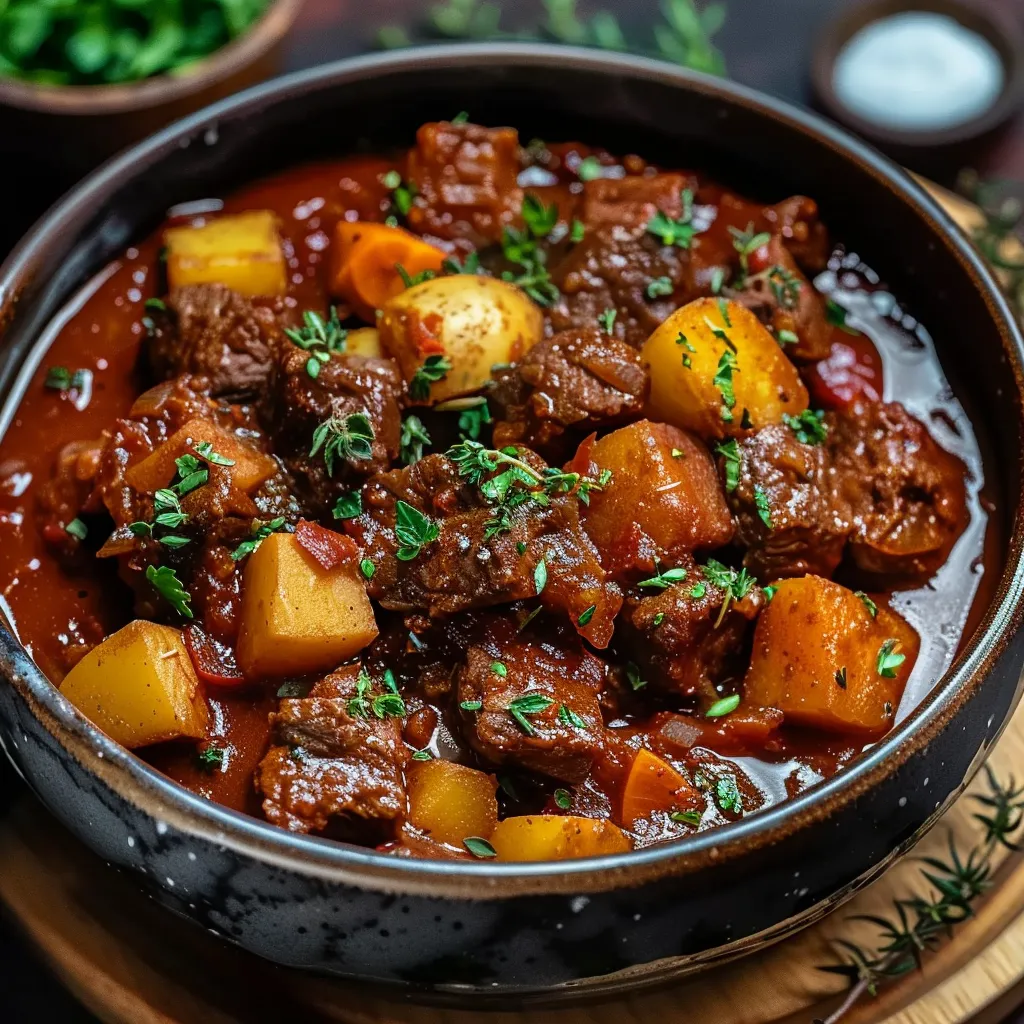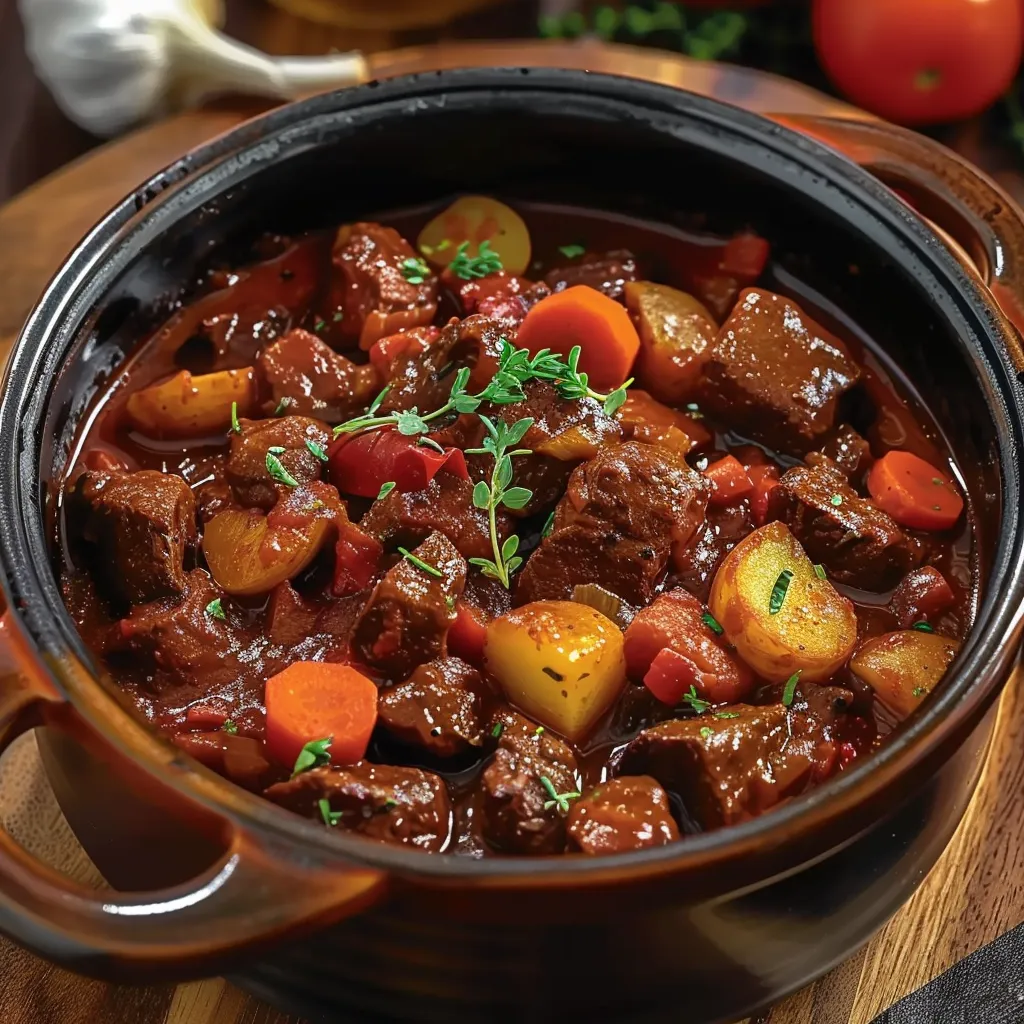 Pin it
Pin it
This hearty Hungarian goulash has been my gateway to Eastern European cooking for years. The deep paprika-steeped broth paired with soft beef chunks makes a soothing stew that turns basic weekday meals into memorable gatherings.
I picked up this dish from my Hungarian friend Mrs. Kovács, who always said true goulash needs time and honor for custom. Her recipe turned my paprika-doubtful spouse into someone who now asks for this meal every week during cold seasons.
Ingredients
- Lard or vegetable oil: Lard gives you that old-world taste, but veggie oil makes a less heavy option
- Onions (large): They form your flavor foundation, grab ones that feel hard with no mushy parts
- Brisket or beef chuck: These affordable cuts have nice fat running through them and get super tender when cooked slowly
- Sweet Hungarian paprika: This key spice brings the real color and taste, worth spending more on fresh Hungarian paprika
- Broth (beef): Makes everything taste fuller than just water, though water can work if you're in a hurry
- Yukon Gold potatoes: These firmer spuds keep their shape better in the stew
- Carrots: They bring a touch of sweetness and bright color, look for firm orange ones
- Tomatoes: Fresh ones add a nice zing, but you can use tomato paste in colder months
- Garlic: Gives the stew more flavor layers, always go with fresh cloves instead of the jarred stuff
- Bay leaves: These fragrant leaves add a subtle but important background note
Step-by-Step Instructions
- Get Everything Ready:
- Cut your onions the same size so they cook evenly. Slice beef into matching 1-inch squares for proper cooking. Chop potatoes into similar chunks so they finish cooking at the same time.
- Create Your Flavor Foundation:
- Warm oil in a big Dutch oven over medium heat until it ripples but doesn't smoke. Toss in onions and cook for 8-10 minutes until they turn golden brown. This browning builds your base flavor. Put beef chunks in with space between them. Cook in smaller batches if needed to avoid packing them too tight. Brown for around 2 minutes each side until they're dark all over. Good browning adds tons of taste.
- Mix in Paprika and Liquid:
- Take the pot off heat for a moment to add paprika without burning it. Mix well to cover all meat. Right away pour in some broth and scrape the pot bottom with a wooden spoon. This step pulls all those tasty bits into your goulash.
- Add Broth and Veggies:
- Pour all remaining broth in and let it start bubbling. Turn heat down to keep a low bubble. Drop in potatoes, carrots, tomatoes, garlic, bay leaves, salt, and pepper. Make sure everything sits under the broth. Add bell pepper now if you're using it.
- Let Everything Soften:
- Put the lid on and let it bubble gently for about 1.5 to 2 hours. Check now and then, stirring carefully to stop sticking. Your goulash is done when beef pulls apart easily with a fork and veggies are soft but not mushy.
- Dish Up:
- Fish out bay leaves first. Scoop hot goulash into deep bowls and top with fresh parsley if you want. Eat with crusty bread for soaking up the tasty liquid or over egg noodles for a bigger meal.
My Hungarian buddy taught me that amazing goulash comes down to good paprika and taking your time. She always told me, "You can't hurry goulash any more than you can rush making friends." After cooking this dozens of times, I totally get what she meant. The slow cooking lets all the flavors mix together in ways quick cooking just can't match.
What Makes Hungarian Paprika Special
Sweet Hungarian paprika is nothing like the basic stuff at most stores. It's bright red with a rich sweetness and earthy notes that really make authentic goulash shine. Keep your paprika somewhere cool and dark, and buy fresh every six months since it loses its punch quickly. For extra flavor depth, try mixing sweet and hot Hungarian paprika based on how spicy you like things.
Prep Ahead and Keeping Leftovers
Goulash actually tastes better after sitting a while as the flavors keep blending. Make it the day before for the best taste. Keep what's left in a sealed container in your fridge for up to 4 days. When warming it up, add a bit more broth if it's gotten too thick. If you want to save it longer, freeze in meal-sized containers for up to 3 months. Let it thaw in the fridge overnight before warming gently on the stove.
Different Versions Around Europe
Across Central Europe, you'll find tons of goulash styles. In Hungary, it's usually thinner like soup and comes with crusty bread. Czech folks make theirs thicker and often serve it with bread dumplings. Austrian versions might include wine. My recipe mostly follows the Hungarian way but uses ingredients you can easily find at your local store.
 Pin it
Pin it
This dish has completely changed my winter cooking. Goulash isn't just food, it's a journey of taste and warmth.
Frequently Asked Questions
- → What’s the best beef cut for making Hungarian goulash?
Chuck roast or brisket are great choices. These cuts become soft and flavorful when cooked low and slow.
- → Can smoked paprika replace sweet paprika?
Yes! While sweet paprika is classic, smoked paprika adds a smoky layer of flavor to the dish.
- → What sides go well with Hungarian goulash?
Pair this dish with crusty bread, fluffy egg noodles, white rice, or even a simple green salad for balance.
- → How much time does it take to cook Hungarian goulash?
It usually takes 1.5 to 2 hours for the meat to tenderize and the flavors to fully develop.
- → Can I prepare goulash ahead of time?
Absolutely. It actually tastes better the next day! Keep it in an airtight container and reheat gently before serving.
- → Does Hungarian goulash have a spicy kick?
Traditional versions aren’t spicy, but the paprika type and amount you use will affect the heat level.
